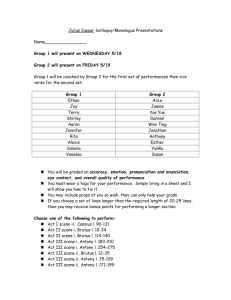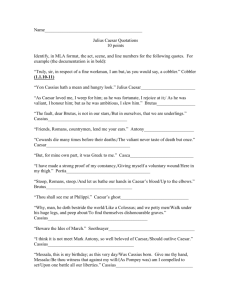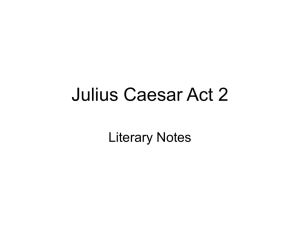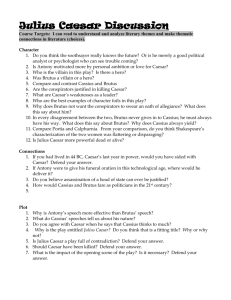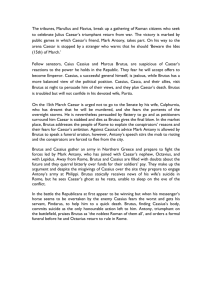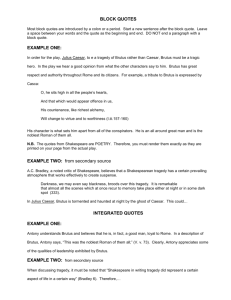Julius Caesar
advertisement
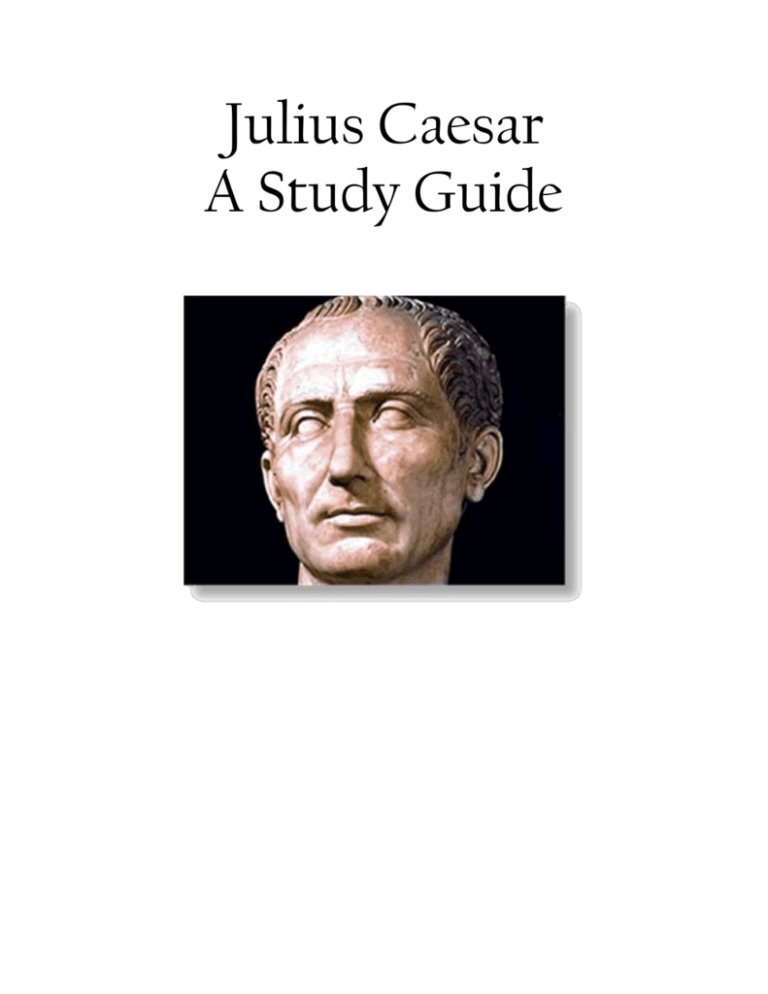
Julius Caesar A Study Guide Act I (All reading, annotations and vocabulary for this section are due Monday/Tuesday, October 6/7) Critical Thinking Questions: Be ready to discuss these questions during class. 1. What makes Julius Caesar appealing to the common citizens of Rome but so unappealing to elected officials like Marullus and Flavius? 2. In scene ii, how does Caesar’s refusal of the crown make him even more popular with the people of Rome? 3. Although Brutus and Cassius both plot to assassinate Caesar, in what ways do their motives differ? 4. To which of Brutus’ ideals does Cassius need to appeal to convince Brutus to betray his friend Caesar? 5. In scene iii, how does Cicero’s interpretation of the strange storm contrast with that of Cosca? Vocabulary: Create a vocabulary card for each of the terms below. Scene i 1. battlement 2. vulgar Scene ii 3. barren 4. cogitation 5. countenance 6. throng Scene iii 7. conceit 8. construe 9. ordinance Act II and III(All reading, annotations and vocabulary for this section are due Tuesday/Wednesday, October 14/15) Critical Thinking Questions: Be ready to discuss these questions during class. Act II 1. In scene one, what has Brutus already concluded about Caesar prior to Cassius’ arrival with the other conspirators? 2. In scene one, what reasons does Brutus give for not assassinating Antony along with Caesar? 3. What do you think makes the arguments that eventually convince Brutus to join the conspiracy valid or invalid? 4. What signs, omens, or superstitions does Shakespeare create in this section to help foreshadow the assassination of Caesar? Are they similar or different to the devices uses by Sophocles in Antigone? 5. Why was Decius able to convince Caesar to go to senate? Act III 1. How does Brutus justify the assassination of Julius Caesar to the citizen’s of Rome? 2. What conditions does Brutus impose on what Antony may say at Caesar’s funeral? 3. How does Antony go about turning the people of Rome against Brutus, Cassius, and the other conspirators? 4. What does the death of Cinna, the poet, show the audience about the reaction of the people of Rome to Caesar’s death? Vocabulary: Create vocabulary cards for each of the terms below Act II Scene i 1. extremities 2. faction Scene ii 3. imminent 4. valiant Scene iii 5. contrive Scene iv 6. fray Act III Scene i 1. petition 2. redress scene ii 3. censure 4. entreat 5. extenuate 6. grievous Act IV (All reading, annotations and vocabulary for this section are due October 16/17) Critical Thinking Questions: Be ready to discuss these questions during class. 1. Why does Brutus condemn Lucius Pella, one of Cassius’ generals, for taking bribes? 2. Is Brutus justified in condemning Lucius Pella even though he knows his actions may jeopardize his alliance with Cassius? 3. What does the means by which Portia committed suicide say about her character? Vocabulary: Look up the definition for each of the following words and then write out what you think the word means in your own words. A good resource for this section is m-w.com (Merriam Webster). Scene i 1. provender Scene ii 2. mettle Scene iii 3. chastisement 4. testy Act V (All reading, annotations, and vocabulary for this section are due October 27 after Fall Break) Critical Thinking Questions: Be ready to discuss these questions during class. 1. In what ways is Cassius’ suicide in keeping with his character throughout the play? 2. Why do Brutus’ actions cause Antony to eulogize him as “the noblest Roman of them all”? *Eulogize- to speak or write of in high praise 3. Do you agree with Antony’s reasons for calling Brutus noble? 4. Compare Brutus with Antigone. How are they similar/different? Vocabulary: Create vocabulary cards for each of the terms below Scene i 1. ensign 2. gallant Scene ii 3. engender 4. misconstrue
